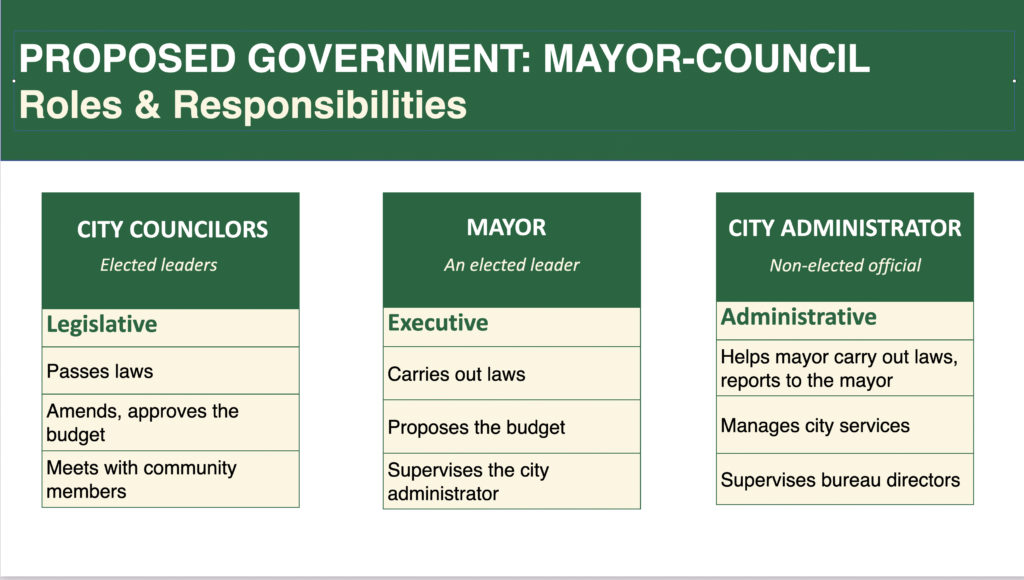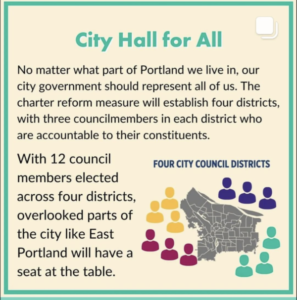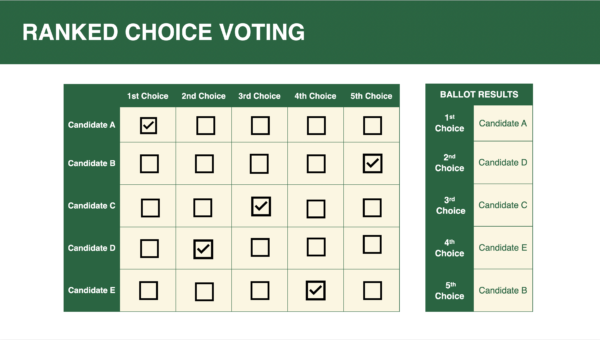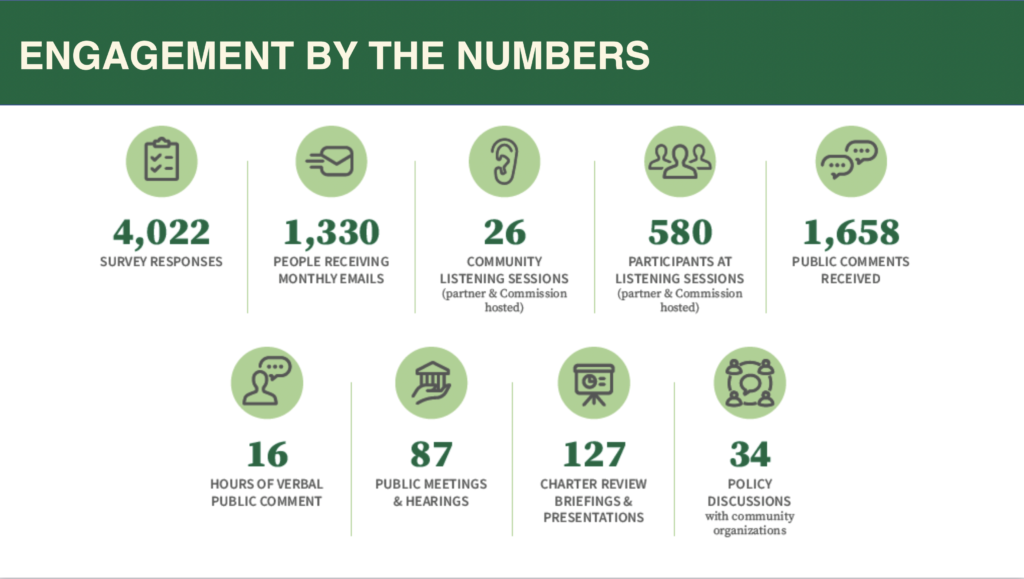
The League of Women Voters of Portland bases our support for Portland Charter Reform on our balanced in-depth studies of Portland’s Government and of Election Methods. After reading and discussing these studies, our members adopted advocacy positions that we used to evaluate the charter reforms that voters approved in 2022. We concluded that the reforms will substantially improve Portland’s government and elections. They will make our government more effective, responsive and representative. Our elections will be fairer and enable more voters to elect city councilors who represent their interests. Below are the details on our Top Ten Reasons.
1. The charter reforms will create a separation of powers. The powers of the Councilors and Mayor are balanced.
-
-
- The Council passes laws. It no longer manages bureaus.
- The Council may not exercise any of the executive and administrative powers granted to the Mayor by the Charter.
- The Mayor has the executive and administrative powers.
- The Mayor carries out the laws.
- The Mayor has the same authority to propose new legislation as the councilors.
- The Mayor breaks tie votes of the Council. This tie-breaking vote prevents gridlock. *
- The Mayor submits the city budget.
- The Mayor supervises the City Administrator, so that an elected official is accountable.
- The City Administrator manages city bureaus, reports to the Mayor, and advises the Council.
-
*Only non-emergency votes could end in a tie. Emergency ordinances require a supermajority to pass.
2. Portland’s City Council will be more effective, responsive and representative.
-
-
- Because the City Council will no longer manage city bureaus, councilors can focus on policy and constituent services.
- A Council with twelve members has the time to respond more promptly and effectively to constituents’ concerns.
- City councilors must live in their districts, so they will be more aware of the issues residents face.
- City councilors will be able to establish offices in their districts and be more accessible to their constituents.
- Proportional ranked choice voting will mean that the councilors from each district will represent a broader segment of the district’s population – both the majority and significant minorities.
-
3. Management by a professional City Administrator, supervised by the Mayor, will improve operations of city services and bureaus.
-
-
- A professional city administrator provides more efficient management and better coordination among the bureaus.
- Because the Mayor supervises the City Administrator, an elected official is accountable.
- The City Administrator must be a person of “demonstrated administrative ability with experience in a responsible, important executive capacity.”
- The Mayor must choose the City Administrator solely on the basis of executive and administrative qualifications.
- The City Council must confirm the Mayor’s choice.
- The City Administrator’s duties specified in proposed charter amendments include:
-
- Overseeing all directors of bureaus and departments and all employees
- Helping the Mayor advance the City’s core values of equity, transparency, communication, collaboration and fiscal responsibility and the City’s efforts to address the climate crisis and prioritize environmental justice
- Attending meetings of the Council and keeping the Council fully advised as to the financial condition and needs of the City
- Helping to prepare the annual budget under the direction of the Mayor for the Mayor’s submission to the Council.
-
-
 4. With ranked choice voting, voters have more choices and more power to elect government officials who represent them.
4. With ranked choice voting, voters have more choices and more power to elect government officials who represent them.
- Voters will be able to rank candidates from most to least favorite. Portlanders can vote their conscience for the candidates they like best, without worrying that their votes will be wasted.
- A primary election isn’t needed, because voters can rank the candidates in the general election.
- Voter turnout is higher in November and those voters more accurately reflect Portland’s diversity.
- With ranked choice voting, every vote can have more influence on the outcome of the election. It’s still just one vote for each voter, but votes can be transferred to other candidates the voters ranked.
- Ranked choice voting promotes more positive campaigns because of “at least rank me second” messaging by candidates
- Ranked choice voting ensures that single-seat winners have at least 50% +1 votes to win in one election in November.
- Multi-winner ranked choice voting enables proportional representation. It allows all voters to be more fully represented in proportion to their percent of the population.
- With multi-winner ranked choice voting, a different set of votes elects each candidate. So when three candidates are each elected with more than 25% of the total votes, together the three winners get more than 75% of the votes.
5. Ranked Choice Voting is an easy, proven way to vote. It’s used in other countries and increasingly in the U.S.
-
-
- Filling out a ranked choice ballot is easy. Ballots look alike for both single-winner and multi-winner elections.
- We rank things all the time in our daily lives, so the idea behind ranked choice voting is familiar.
- 43 U.S. jurisdictions use ranked choice voting, including the states of Maine & Alaska, and this number is growing.
- The method proposed for Portland for multi-winner ranked choice voting is used successfully in a growing number of U.S. cities. Voters in Ireland, Scotland, Australia, and New Zealand use this method in their local government elections – including for city councils.
- Ranked choice vote counting will be ably handled by elections officials using security procedures and technology that must meet federal certification standards. Certified software is available and reliable.
- Research shows voters understand how to complete their ballots. Exit polls show 80-90% of voters understand the ranking process, even the first time. These percentages increase in subsequent elections.
- Measure 26-228 requires voter education to help voters feel comfortable with the new method. But Portlanders are just as smart as folks in other communities that use ranked choice voting. We’ll understand it.
-
6. By electing three city councilors from four geographic districts, we can have both geographic and proportional representation.
-
- Electing three councilors from four districts provides better representation than electing them citywide or from smaller single-member districts. Councilors elected from smaller districts are more likely to make “I just care about my district” policy decisions.
- As demonstrated by this chart, electing twelve councilors from twelve smaller single-member districts would require fewer votes per councilor than electing three councilors from four multi-member districts. The chart shows the disadvantages of most single-member district proposals.
- Single-seat districts are more vulnerable to gerrymandering by insider political interests.
- To address racial equity with single-seat districts, communities of color would have be segregated, but this is not the case in Portland.
- Proportional representation within geographic districts allows voters to elect representatives who –
 as a group – broadly reflect the interests of the people they serve. With our current system, the residents of Portland are not broadly represented in terms of geography, gender, ethnicity, wealth and other factors.
as a group – broadly reflect the interests of the people they serve. With our current system, the residents of Portland are not broadly represented in terms of geography, gender, ethnicity, wealth and other factors. - Proportional representation means groups of significant size – such as the working class, people of color, young people, renters, and seniors – have a greater opportunity to elect a Councilor who understands their concerns. Ranked choice voting with multi-member district elections will increase the range of people and views included, making for a more equitable and effective government.
7. An Independent District Commission will draw district boundaries.
-
-
- Independent Commission sets council district boundaries, instead of Council members, who have a conflict of interest.
- District size will be based on an equal population requirement.
- Initial districts will be drawn with updated population data prior to 2024 elections.
- District boundaries will be redrawn every decade after the census.
- Criteria for selecting the District Commission and how to draw boundaries are in Measure 26-228.
- Public input on the district plan is also required.
-
- 8. An Independent Salary Commission will set salaries for elected officials.
-
-
- Currently Portland’s elected officials set their own salaries with no guidelines.
- The Independent Salary Commission will be empowered to set the salaries of Portland’s elected officials.
- The Charter Commission knew that setting salaries is a job for human resource professionals. Their proposed amendment requires this professional expertise on the Independent Salary Commission.
-
9. The benefits more than justify the costs.
-
-
- The Charter Review Commission requested cost estimates that were made by City Budget Office.
- Start-up estimates for 2022-25 preparations to set up the new systems are estimated at $4.0 million to $5.9 million per year, or between 0.6% and 1.0% of Fiscal Year 2022-2023 discretionary resources.
- The $900,000 to $8.7 million annual cost estimate after January 2025 represents 0.1 % to 1.4% of Portland’s discretionary funding.
-
The benefits and cost savings will far outweigh the expense of the new system. At most the expense will be only 0.14% of the city’s annual budget.
-
- Annual cost estimate considerations included:
- More Councilors but fewer staff than in current Commissioners’ offices since no bureau management responsibilities.
- Expanded Councilor office space needs.
- Fewer mayoral staff than currently, but probable higher costs in City Administrator office.
- Ranked choice voting: City responsibility for tabulation software and public education costs. City elections office staff increase.
- Estimates do not reflect all possible savings due to ending Commissioner management of bureaus.
- Although costs will increase, they are balanced by needed governance and voting benefits.
-
10. These proposals were developed by a diligent, transparent Charter Review Commission.
-
-
- The Charter Review Commission recommended Measure 26-228 by a 85% supermajority vote.
- Each member of the current City Council appointed four members of the 20-member volunteer Charter Commission.
- Commission members have extensive experience working on equity and government issues.
- The Commission worked for 18 months with full transparency of its meetings and public hearings. It received 1,658 public comments, 4,022 survey responses, and held 187 listening sessions and briefings.
- Commission independence was a notable feature in the charter review process adopted by Portlanders in 2007 with a resounding 76% vote.
-


